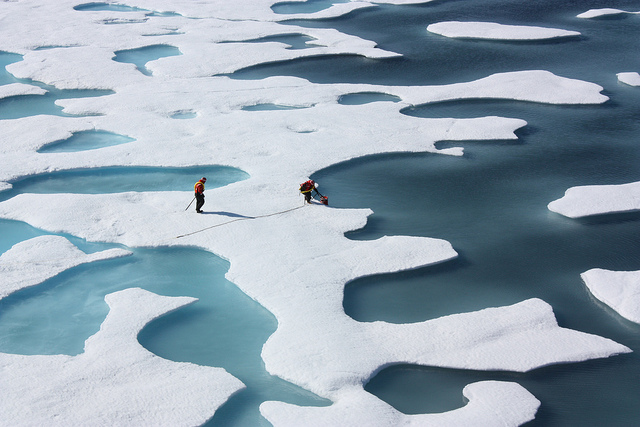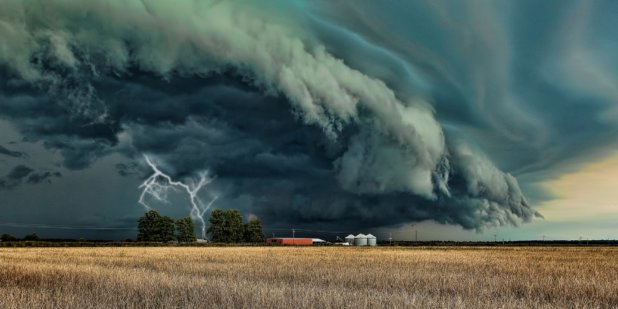- About
- Topics
- Picks
- Audio
- Story
- In-Depth
- Opinion
- News
- Donate
- Signup for our newsletterOur Editors' Best Picks.Send
Read, Debate: Engage.

the carbon dioxide content in the atmosphere has risen to 410 ppm (parts per million), the highest value ever measured. This year's May was declared the hottest May since the beginning of weather records, once again, as in the previous year and the year before. In the Antarctic, an iceberg twice as big as Luxembourg is about to break free from the ice shelf and is set to make its way up north. Both, north-east and north-west passages are now regularly passable by ship in summer; some researchers assume that the Arctic Ocean will be completely free of ice in summer by 2030. And one of the largest oil companies in the world, ExxonMobile, and its Russian counterpart Rosneft have agreed to start drilling in the Kara Sea north of Russia's Arctic Ocean coastline, at an oil field bigger than all of Saudi Arabia's known reserves.
the reigning President of the United States appears front of the world press in the Rose Garden of the White House and declares that the United States of America withdraws from the Paris Agreement, the climate protection treaty adopted at the World Climate Conference in Paris in 2015.
Does this mean the end of climate protection efforts worldwide? Is the fight against the melting of the polar caps and the glaciers, the rise of the sea level over now? The spread of the deserts? The loss of the rainforests? Of biodiversity? Of drinking water? Of the very basics of life?
government leaders around the world are declaring their commitment to continue and to intensify the fight against climate change. Senators from California and other US states, as well as mayors of countless US cities openly claim they will go on and go ahead to protect our climate despite the announcement of the US president. Global corporations, even US-American energy companies, are committing themselves to climate protection by announcing that the age of fossil fuels must be overcome, and that the future belongs to renewable energies. Not to mention the millions of people who put solar panels on top of their roofs; who order "clean electricity" from alternative vendors; who recycle glass and paper, and try to avoid plastic waste; who change their bank accounts to make sure that their savings are used in a sustainable way; who act as responsible shareholders and urge their companies to act responsible, too.
"We, the citizens of the world, are in charge, too."
In autumn, yet another World Climate Conference will be on the agenda, this time in the former German capital Bonn. A good opportunity for FAIRPLANET to present a dossier on "Climate Change & Divestment" – as an appetizer, so to speak.
For it's not only the governments and corporations that can take on climate change. We, the citizens of the world, are in charge, too. Everybody can do something, can get active to some extent. We can use our power as consumers, as money savers, as citizens. 'Divestment' is the new mantra of many activists around the world who want to unleash the power of the individual to save the world.
Anne Weiss, a well-known author of non-fictional books, tells us about the "Generation Doomsday" and how we took up the fight against climate change in the 1980s until today.
Harald Kunstmann from Karlsruhe Institute of Technology explains how climate research works in detail and shows us the latest state of the art.
Moussa Waongo has its story to tells about how climate change is already causing major problems for farmers in West Africa. Scientists from Europe and Africa present a simple and effective method of weather forecasting that could help many farmers to adapt to climate change.
Oemar Idoe, project leader of a German development aid organization, reports from Bangladesh, a country directly threatened by climate change, describing the consequences of the loss of the mangrove forest in Bangladesh for the local people.
Alexander El Alaoui presents the case of a Peruvian farmer who has dragged a German energy company to court for climate-damaging practices.
Josephine Koch takes a closer look back at the famous 'Yasuni ITT initiative', which gave rise to such great hopes, not only for Ecuador's rainforest, but also for the world to overcome the fossile threat to our climate. She explains what went wrong and what can still be done.
Finally, Alexander El Alaoui introduces the concept of divestment in detail, an idea in which many experts see a very benign way of achieving the targets of the Paris Agreement to save our planet.
there is still time to take our fate into our own hands. But we should not wait too long.
